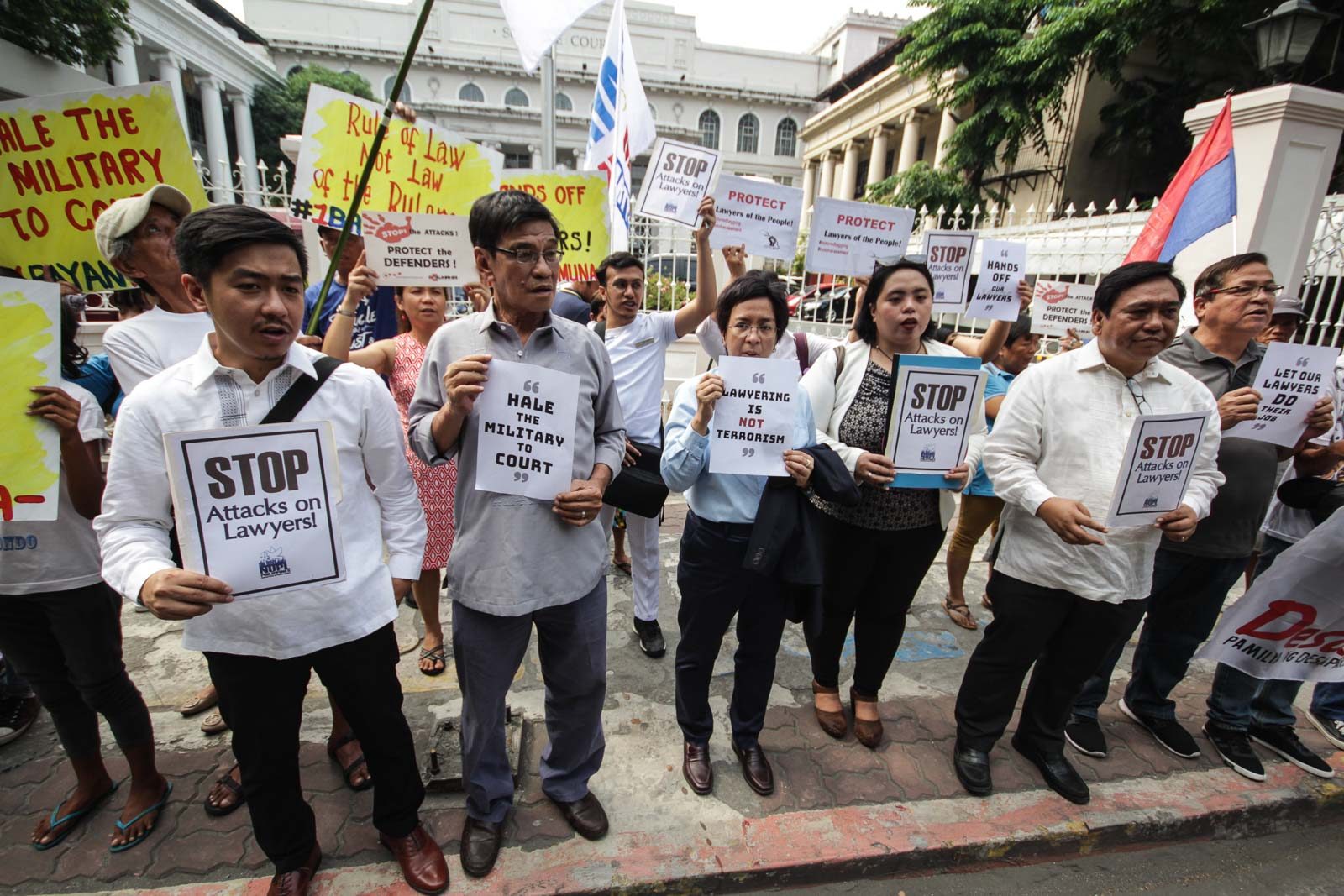SUMMARY
This is AI generated summarization, which may have errors. For context, always refer to the full article.

MANILA, Philippines – The Duterte government dismissed as “implausible” the accusation of the National Union of Peoples’ Lawyers (NUPL) that its members were being harassed and threatened by the military.
The Office of the Solicitor General (OSG) called NUPL’s petition for a writ of amparo a “conceited and purely implausible allegation that has no factual roots.”
The Court of Appeals (CA) will now rule whether to grant NUPL the privilege of the writ of amparo, or extraordinary reliefs which would protect their liberty and security from alleged military harassment.
The case was submitted for decision after summary hearings that culminated on Thursday, July 18. NUPL president Edre Olalia said the Duterte government did not present any evidence.
The OSG said the accusation that the military has been harassing and red-tagging human rights lawyers are “rejected by the plainest of simple reasoning and logic” and are “the utter height of legal arrogance showing utter disdain to the rules of evidence.”
Evidence
The NUPL and their witnesses presented leaflets that tagged them as communist rebels or linked to the New People’s Army (NPA), the armed wing of the Communist Party of the Philippines. The petition also cited the statements of military general Antonio Parlade Jr that accused the NUPL of having links to communist rebels.
The group also cited incidents of threatening phone calls to their lawyer members.
In just 3 years, the Duterte government has charged 2,370 human rights defenders, according to data compiled by rights group Karapatan. This is more than those recorded during the 6 years of then-president Benigno Aquino III, and during the 9 years of then-president Gloria Macapagal Arroyo. (READ: Duterte’s war on dissent)
But Solicitor General Jose Calida called this a “frantic and desperate cry for undue attention,” according to the OSG’s return of the writ filed on May 8.
Olalia slammed the wording used by the OSG in all its pleadings. “They don’t need our help to point out that the language is gratuitous and the tenor is arrogant…. It is tragic that these innuendos come from brethren and colleagues in the profession,” he said.
Parlade and 6 other generals impleaded in the petition also never appeared in court although they were required once. They all filed a motion to waive their appearance, which frustrated the NUPL even more.
For the NUPL, to force generals to come to court and explain their conduct would have been significant. But in the end, what would matter to the group is to be granted the privilege of the writ of amparo.
The rule of the writ
The NUPL, however, is on a slight disadvantage because the CA denied on June 12 the group’s request for a temporary protection order (TPO). A TPO is one of the interim reliefs that the court can issue while it is hearing the main petition.
The CA said the NUPL did not provide the court a full list of its members who need protection. The CA added it could not issue a TPO to stop members of the military from issuing statements that “malign” them as “Section 14 of the Amparo rule does not provide for the said relief.”
“The problem is that this means they can spew unlimited innuendos and pillory at will, aided and abetted by their defenders who seem to be infected with the virus of arrogance through gratuitous remarks sprinkled all over their court submissions,” said Olalia.
The CA also said that when the Supreme Court issued the writ, a TPO was no longer needed because “the privilege of the writ necessarily entails the protection of the aggrieved party.”
“Thus, given the Supreme Court’s issuance of the privilege of the writ of amparo, there is no need to issue a TPO independently of the former,” said the CA.
Here’s the catch: What the High Court issued was a mere writ, which required only the respondent – in this case the Duterte government – to make a return, or submit an explanation. It also set separate hearings, which was what the CA did.
Section 14 of the Rule of Amparo said the court could issue interim reliefs meanwhile, which includes a TPO, inspection order, or production order.
Section 18 of the rule said it is only upon judgment where the court will issue, if it grants the petition, the “privilege of the writ and such reliefs as may be proper and appropriate.”
“To our understanding, what the Supreme Court earlier granted was only the writ and not yet the privilege of the writ,” Olalia said.
He added they now felt “at a loss” as it would appear they had run out of recourse although the main petition was still to be decided.
“We do not have any effective and immediate domestic remedy to legally protect us from the continuing attacks on our lives, liberty and security and against the relentless vexatious smear campaign by State forces,” said Olalia.
The CA previously denied a similar petition from human rights group Karapatan. – Rappler.com
Add a comment
How does this make you feel?
There are no comments yet. Add your comment to start the conversation.